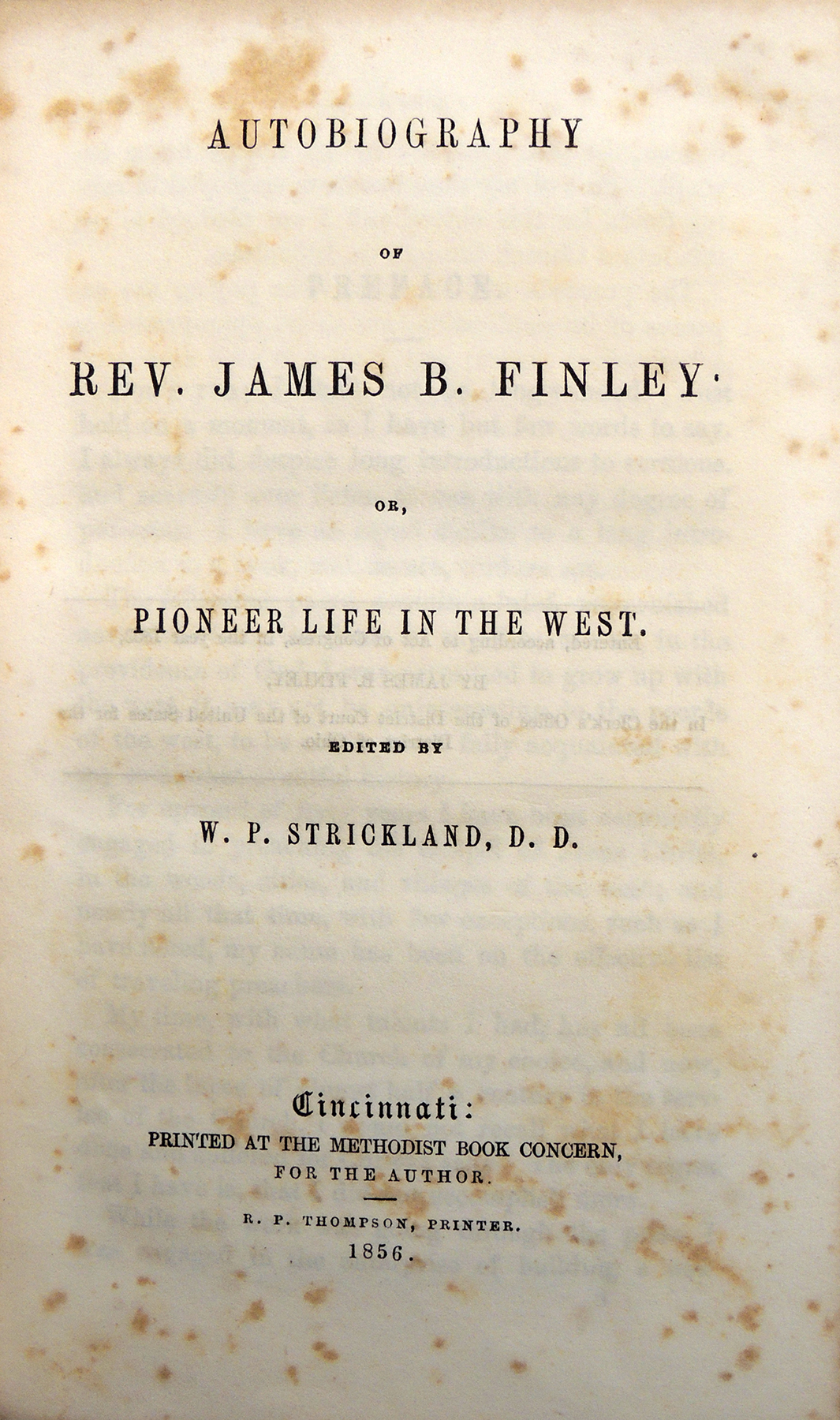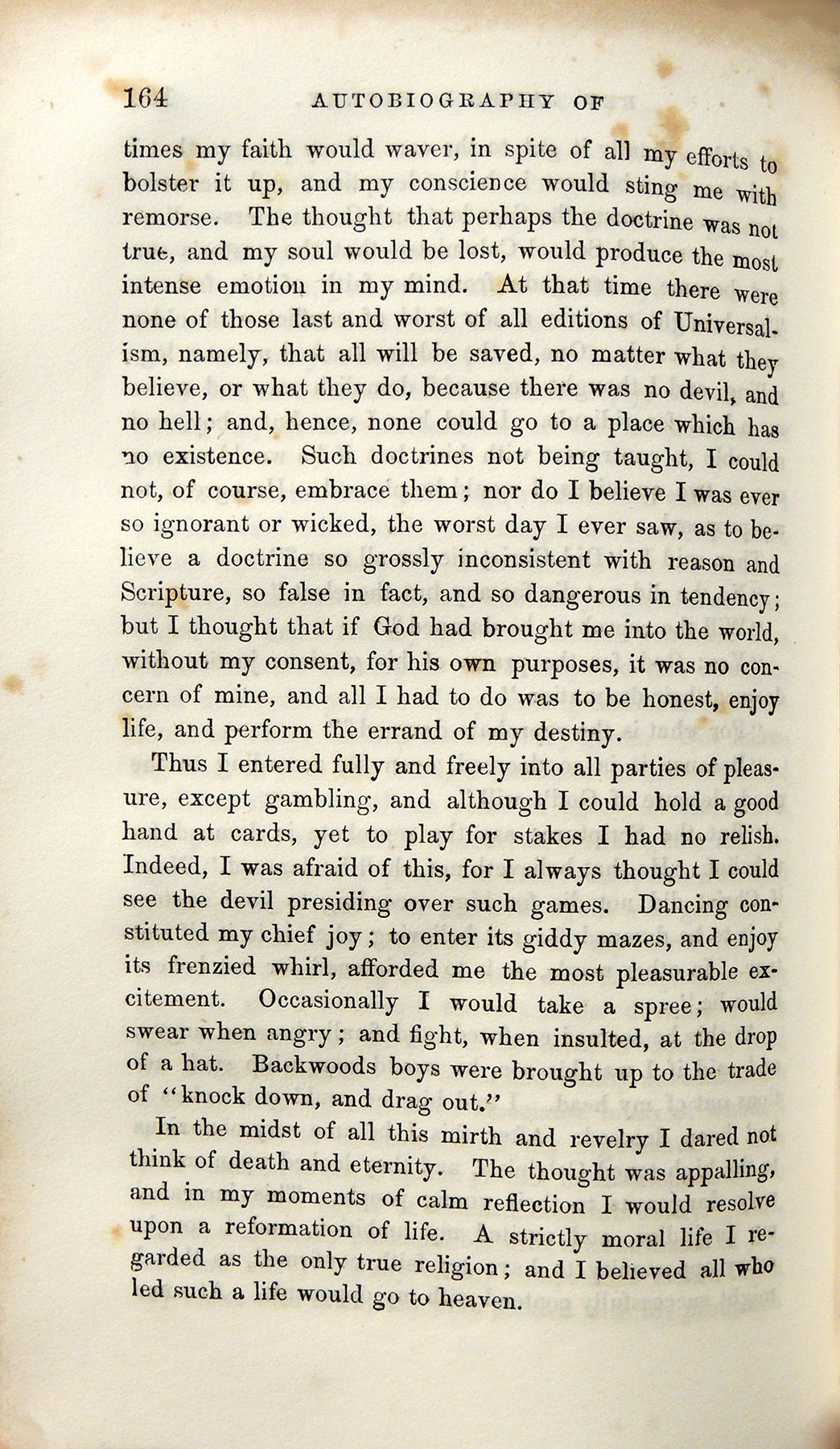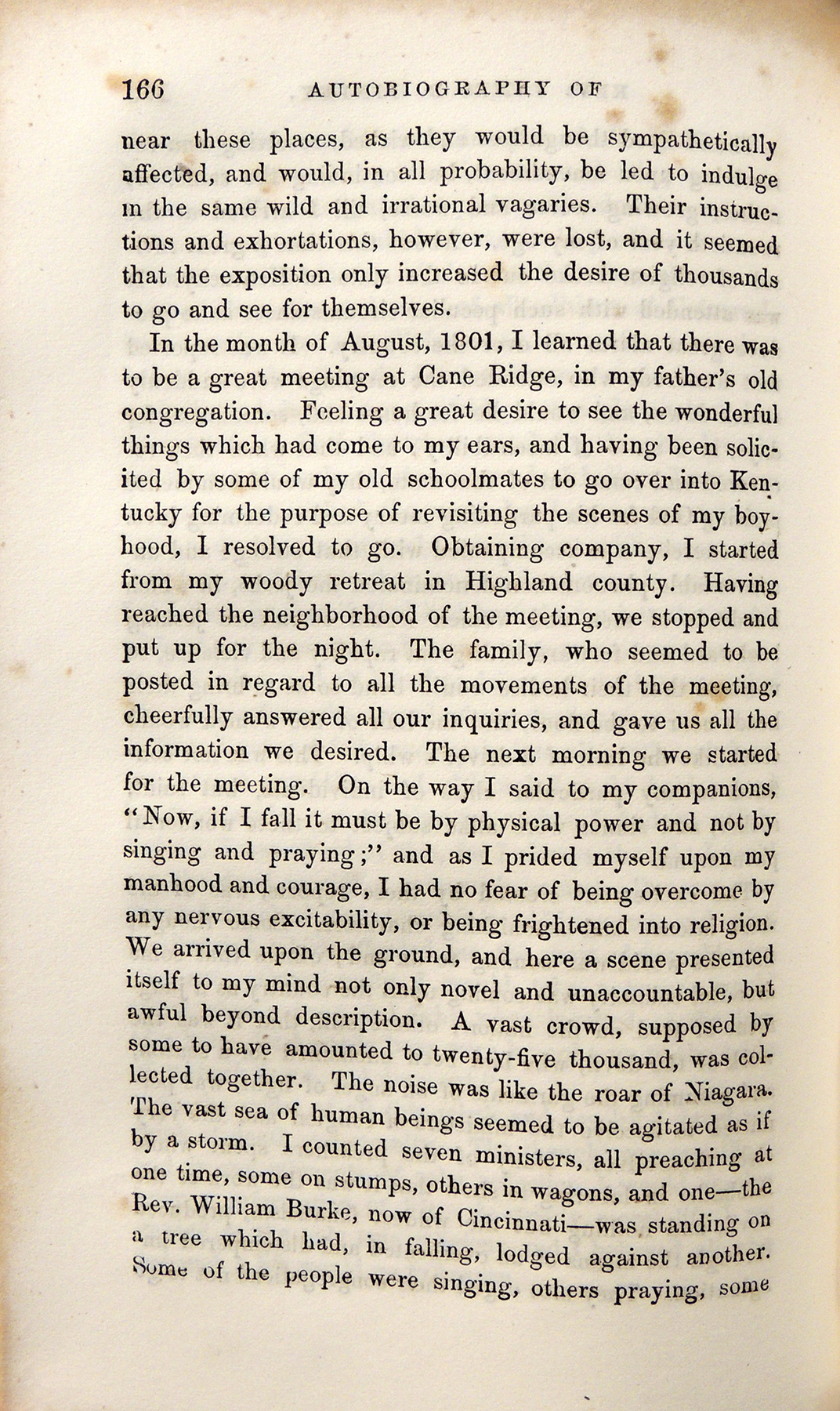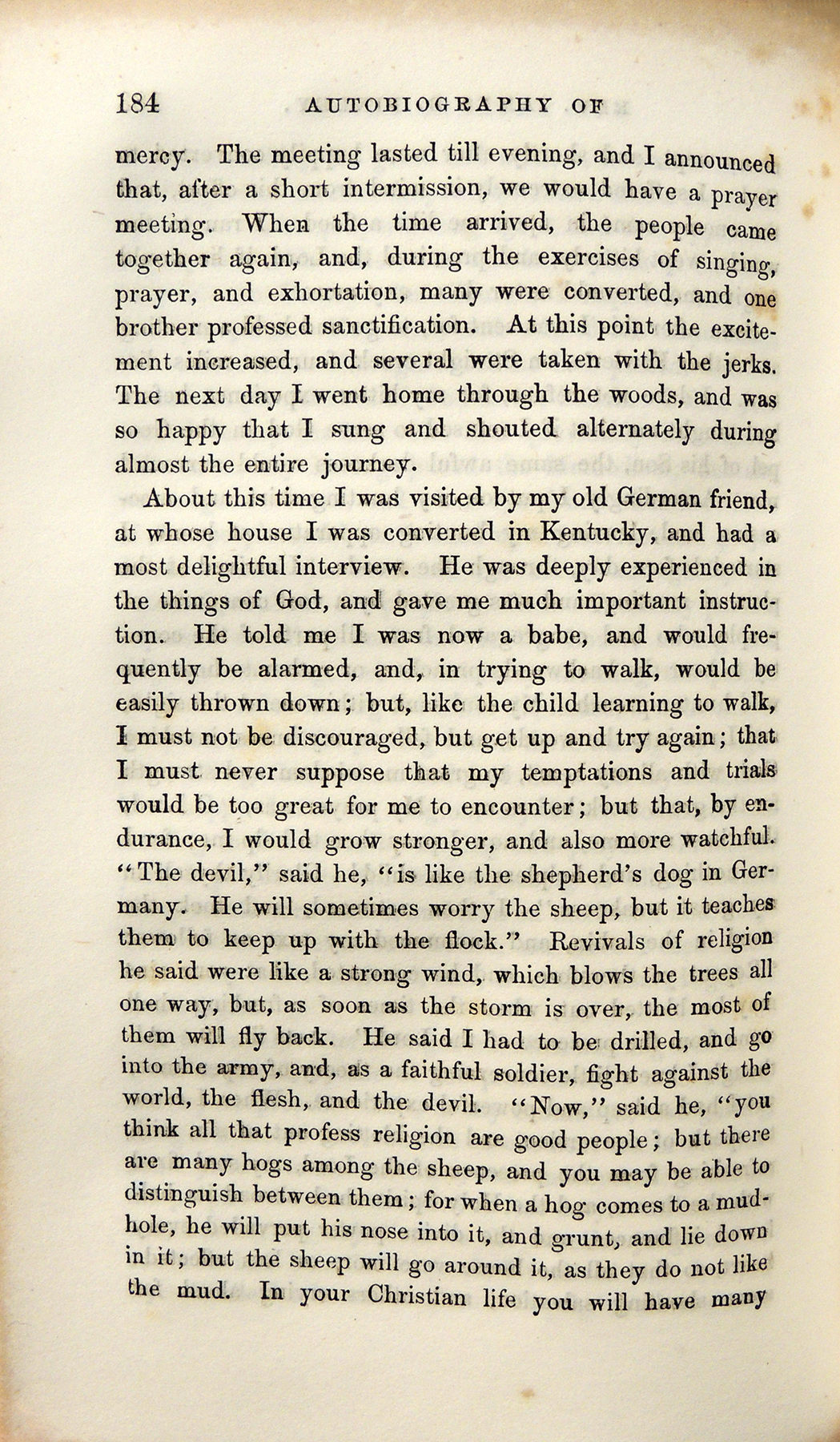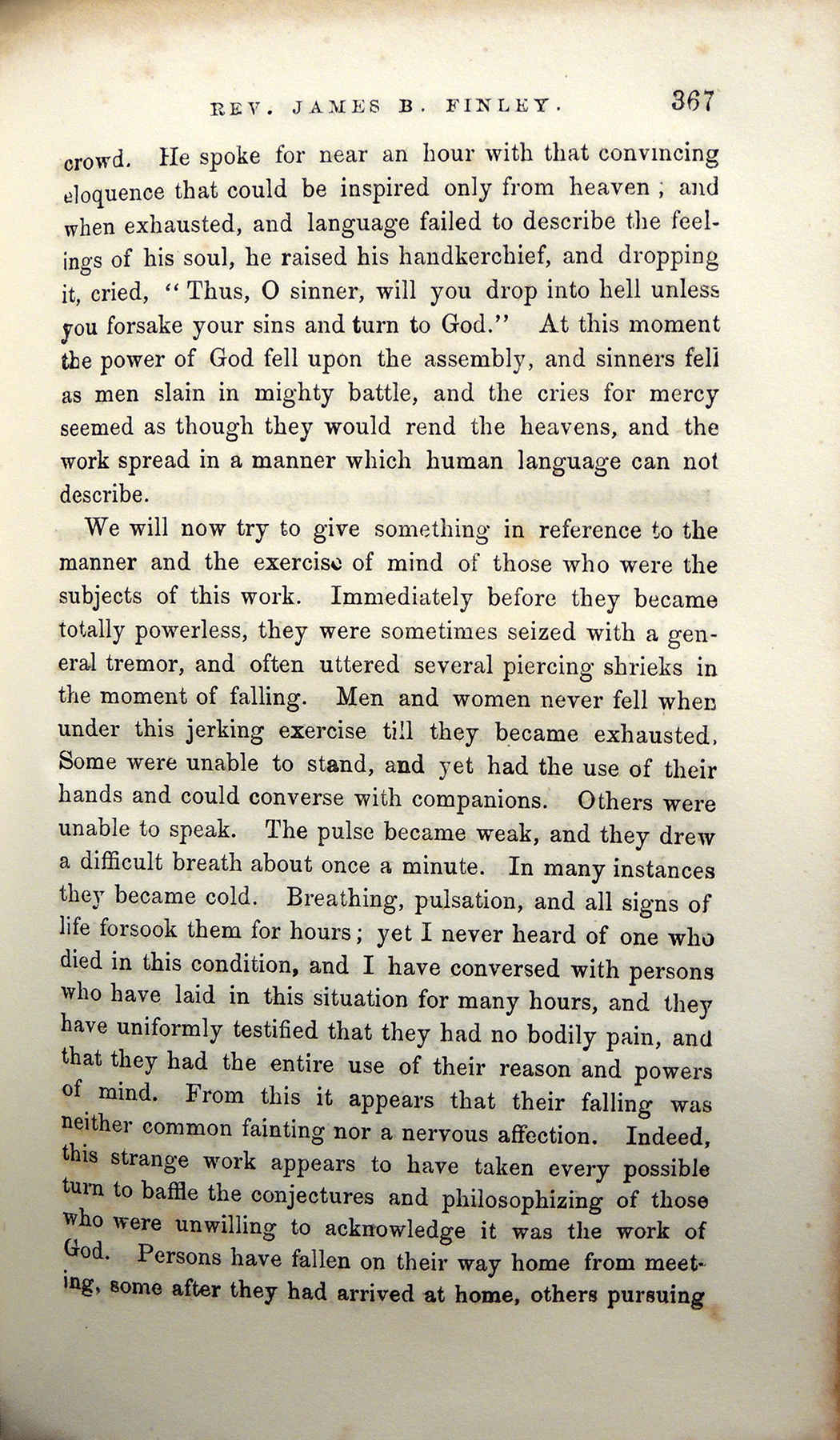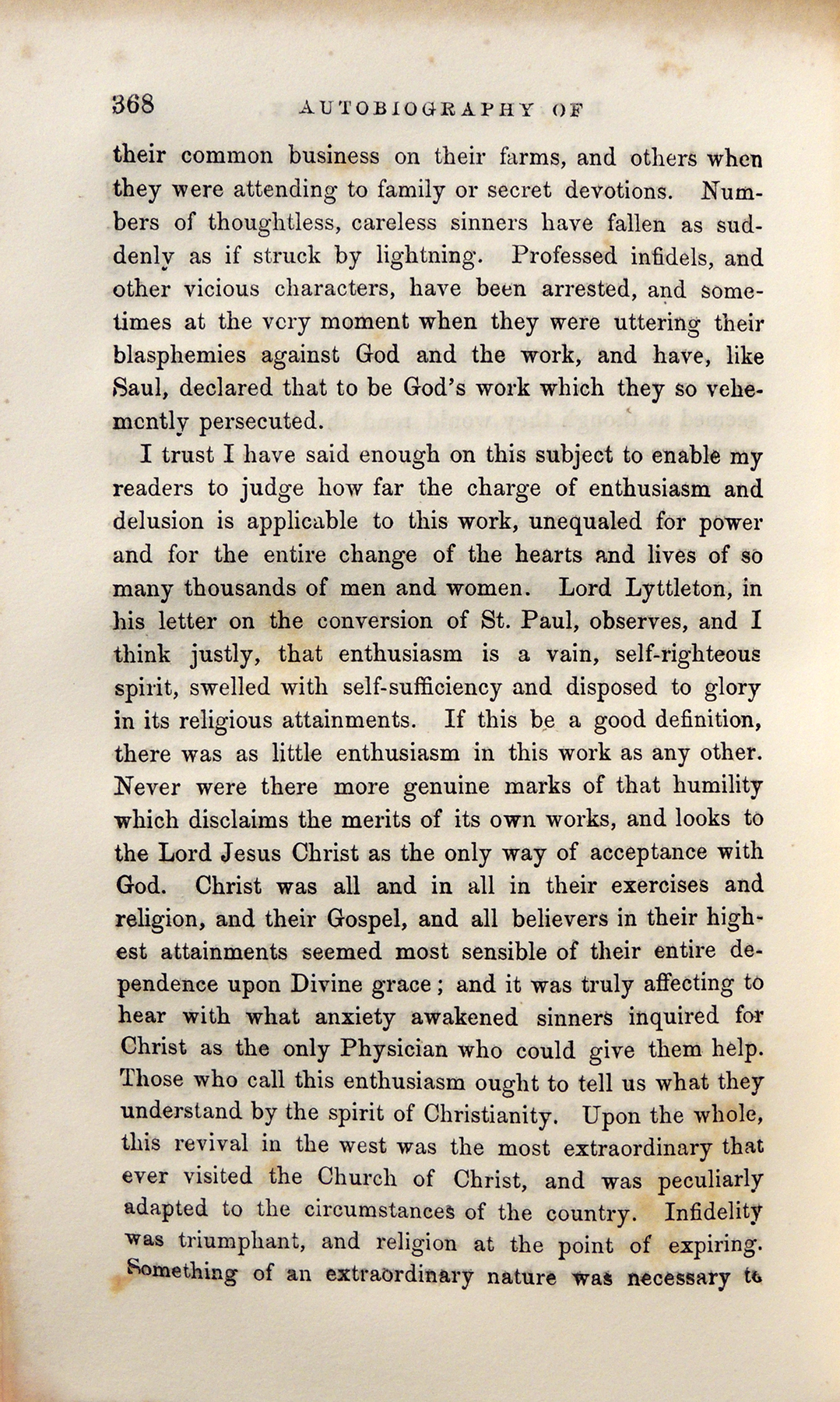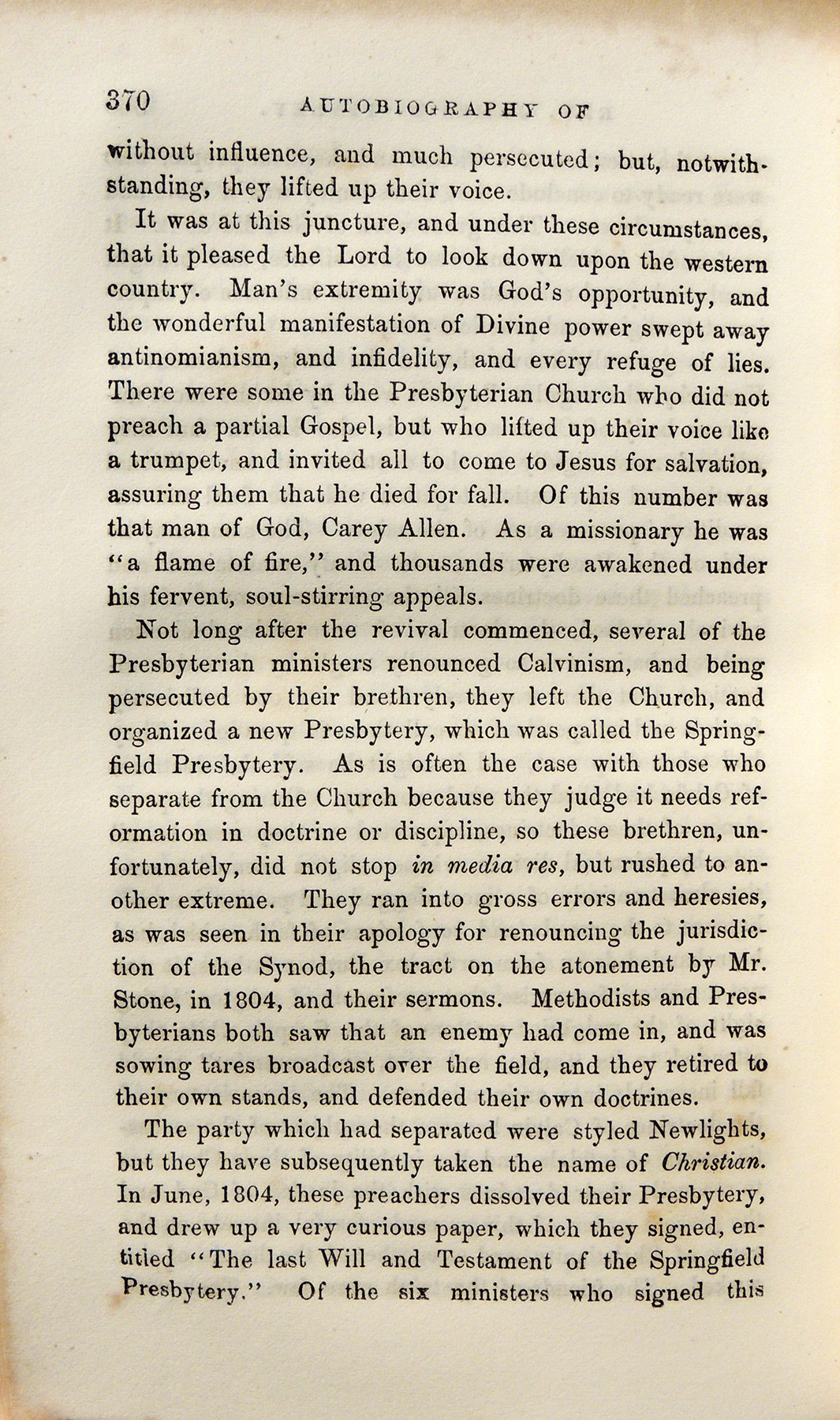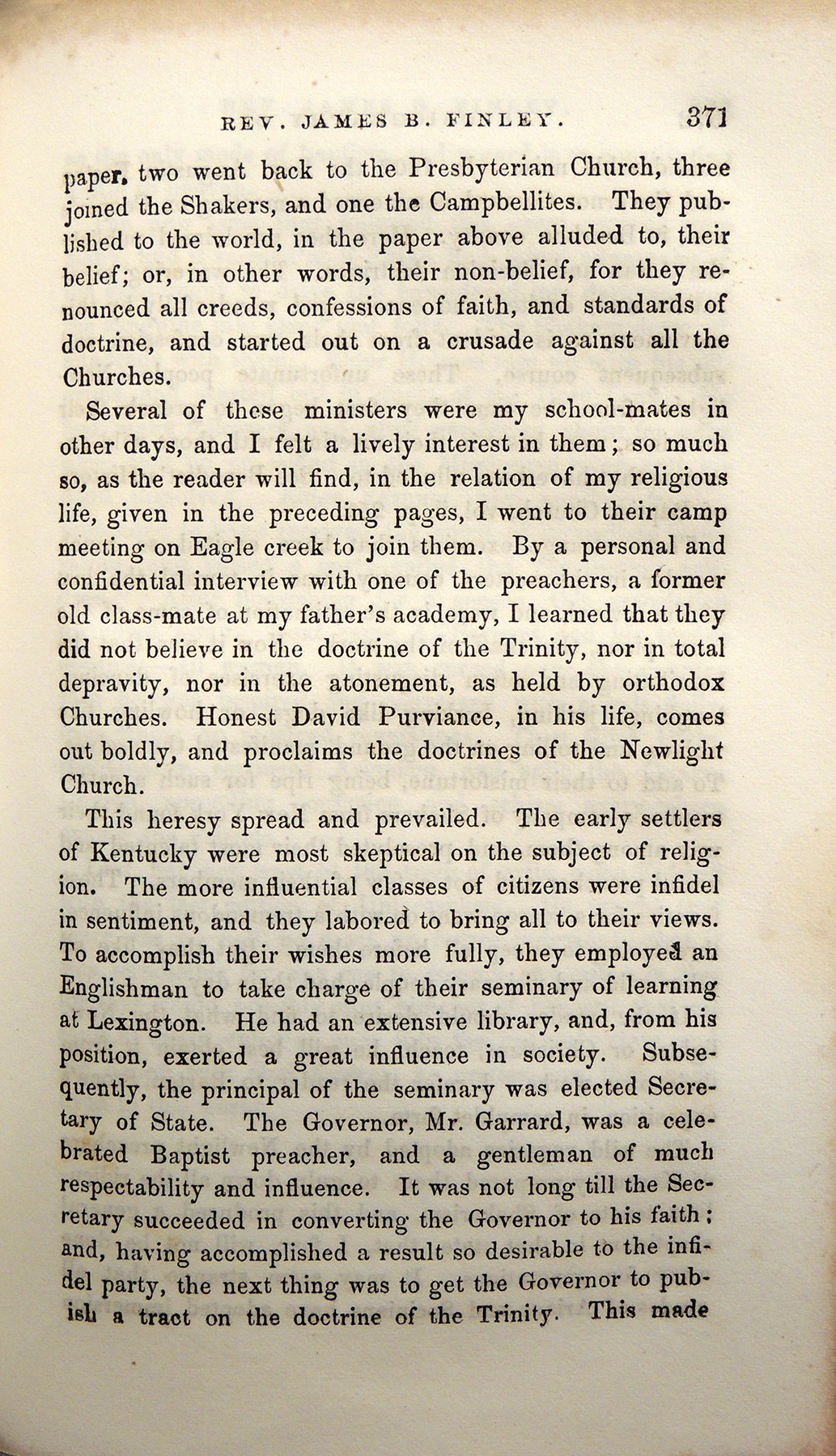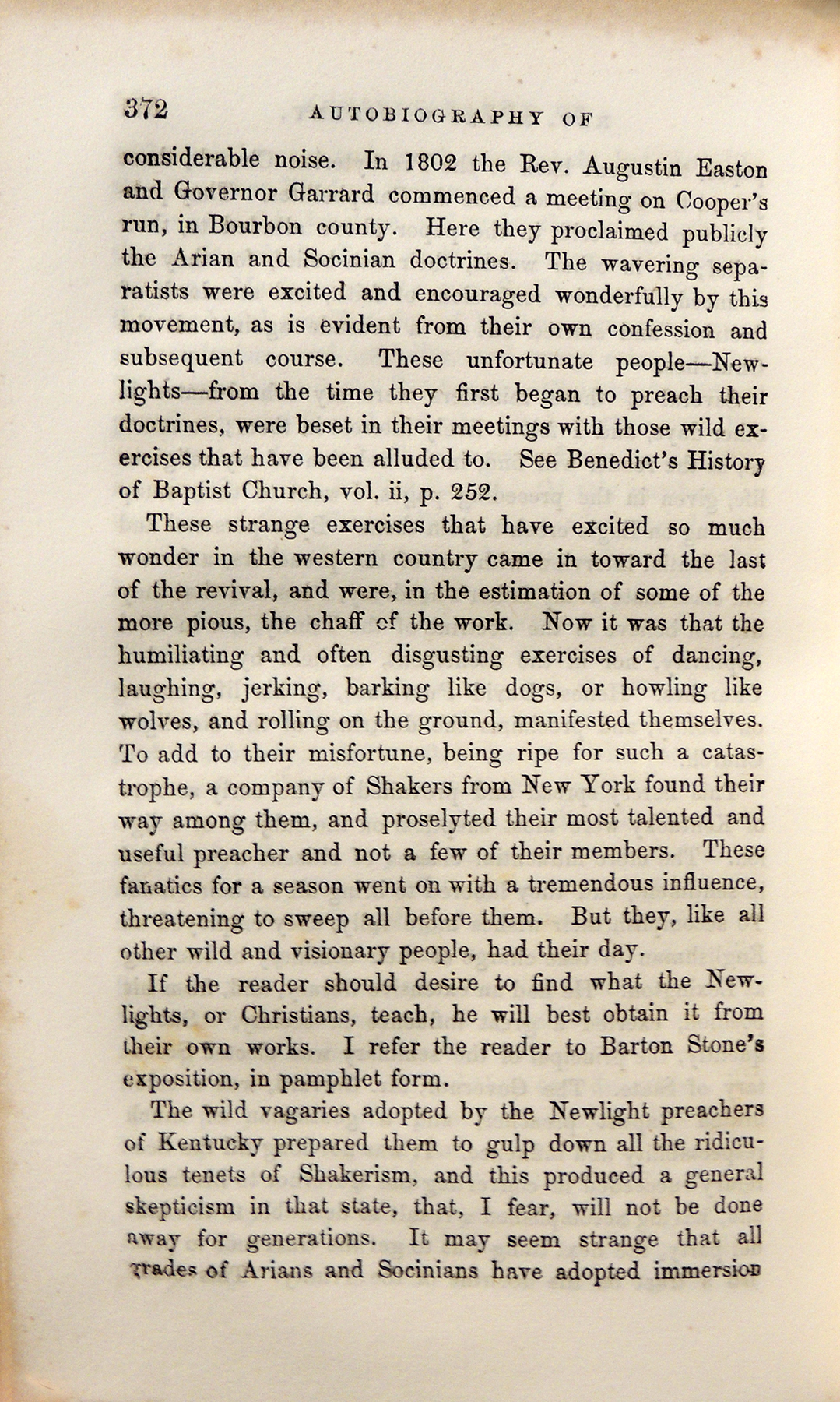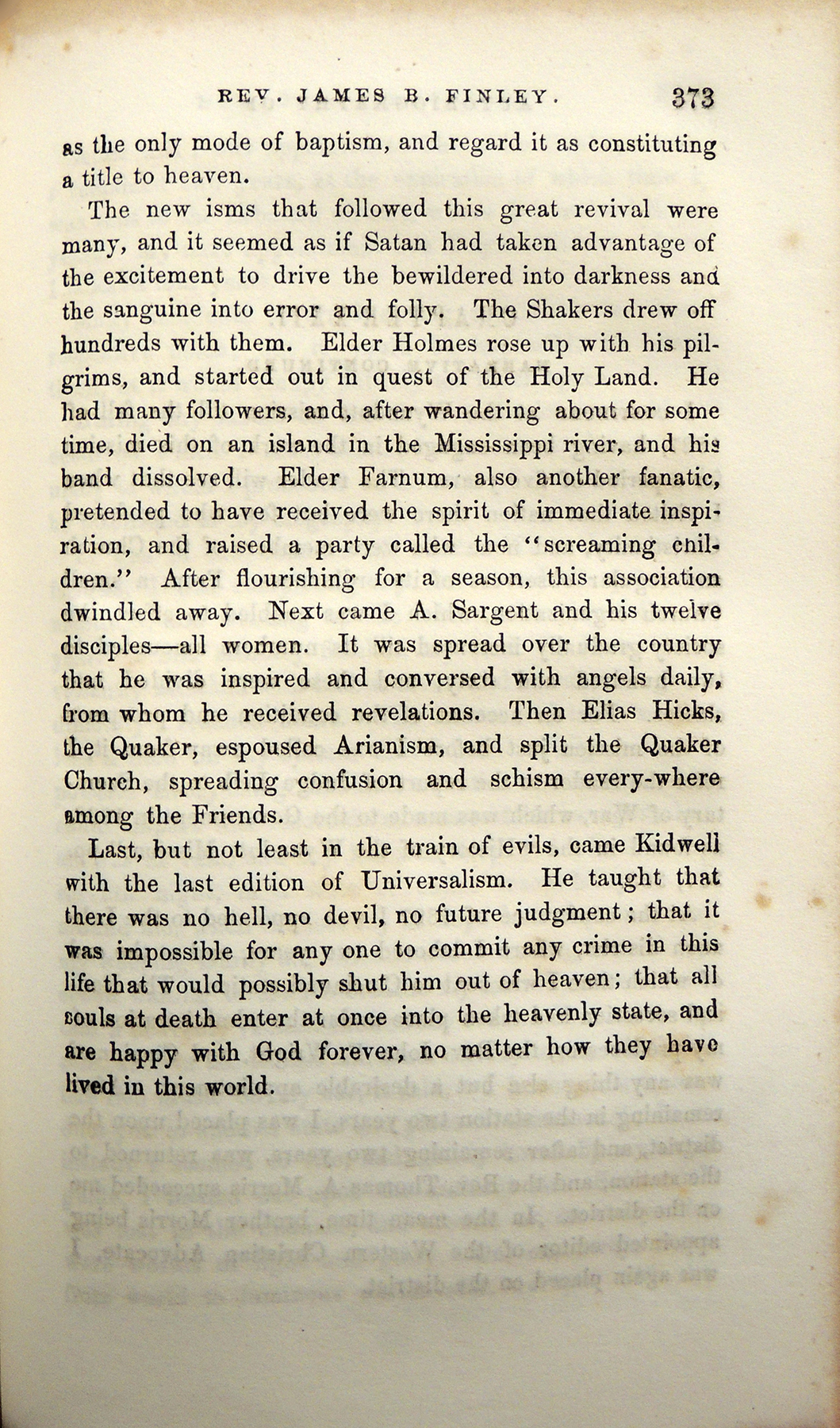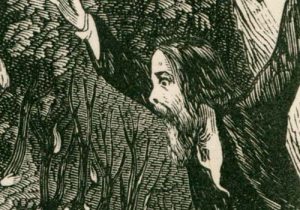Methodist missionary and social reformer James B. Finley reflected on the jerking exercise at several points in his autobiography. Although Finley attended a wide range of revival events—including the famed sacrament at Cane Ridge, Kentucky—his only first-hand encounter with jerkers occurred at a Methodist gathering at Straight Creek, Ohio, during the winter of 1808–1809. Click here for the complete text of the Autobiography of Rev. James B. Finley (1853).
In the midst of all this mirth and revelry I dared not think of death and eternity. The thought was appalling, and in my moments of calm reflection I would resolve upon a reformation of life. A strictly moral life I regarded as the only true religion; and I believed all who led such a life would go to heaven.
Thus I lived thoughtless and wicked, resolving and re-resolving upon amendment, but continuing the same, or, rather, growing worse and worse, till I arrived at the twentieth year of my age [1801]. About this time a great revival of religion broke out in the state of Kentucky. It was attended with such peculiar circumstances as “to produce great alarm all over the country. It was reported that hundreds who attended the meetings were suddenly struck down, and would lie for hours and, sometimes, for days, in a state of insensibility; and that when they recovered and came out of that state, they would commence praising God for his pardoning mercy and redeeming love. This exercise was accompanied with that strange and unaccountable phenomenon denominated the jerks, in which hundreds of men and women would commence jerking backward and forward with great rapidity and violence, so much so that their bodies would bend so as to bring their heads near to the floor, and the hair of the women would crack like the lash of a driver’s whip. This was not confined to any particular class of individuals, but saint, seeker, and sinner were alike subject to these wonderful phenomena.
The excitement created by these reports, was of the most intense and astonishing character. Some thought that the world was coming to an end; others that some dreadful calamity was coming upon the country as a judgment of God on the nation; others still, that it was the work of the devil, who had been unchained for a season, and assuming the garments of an angel of light, was permitted to deceive the ministers of religion and the very elect themselves. Many of the preachers spent whole Sabbaths in laboring to show that it was the work of the devil, and nothing but the wildest fanaticism, produced through the means of an overheated and distempered imagination. They also urged their congregations not to go near these places, as they would be sympathetically affected, and would, in all probability, be led to indulge in the same wild and irrational vagaries. Their instructions and exhortations, however, were lost, and it seemed that the exposition only increased the desire of thousands to go and see for themselves….
Soon after this [winter 1808–1809] I was sent for, to go and hold a meeting at brother Fowler’s, on Straight creek, fourteen miles distant. I dare not refuse, for my bitter experience before had taught me that if I refused to serve God in the Gospel of his Son, the same awful darkness would surround me. Accordingly I put on my hunting-shirt and moccasins, and, leaving my hunting apparatus at home, I started before today, through the woods. I arrived at the place of meeting, and was greeted by a vast concourse of people, who had congregated from all parts of the country to hear the backwoods preacher, or rather to hear the wild hunter preach. My soul sank within me at the sight, and I ran into the woods, and fell on my knees, invoking God, with all my heart, to grant me wisdom and strength for the great work before me. My prayer was, “Lord, thou hast sent me, and now I pray thee to help me; for 1 am nothing, and helpless as a child! Glorify thyself in my great weakness.” I then returned, and took the stand in the cabin, and announced my text as follows: “Repent ye therefore, and be converted, that your sins may be blotted out, when the times of refreshing shall come from the presence of the Lord.” Acts iii, 19. Although I knew little concerning the theory of repentance, yet I had a deep and powerful experience. When I came to speak of conversion, and the blotting out of sin, with refreshing from the presence of the Lord, my soul fired with the theme, and the Holy Spirit shed abroad its hallowed influences, and the divine power pervaded every heart, so that all the house were more or less affected: some shouting salvation, and others crying aloud for mercy. The meeting lasted till evening, and I announced that, after a short intermission, we would have a prayer meeting. When the time arrived, the people came together again, and, during the exercises of singing, prayer, and exhortation, many were converted, and one brother professed sanctification. At this point the excitement increased, and several were taken with the jerks. The next day I went home through the woods, and was so happy that I sung and shouted alternately during almost the entire journey….
We will now try to give something in reference to the manner and the exercise of mind of those who were the subjects of this work. Immediately before they became totally powerless, they were sometimes seized with a general tremor, and often uttered several piercing shrieks in the moment of falling. Men and women never fell when under this jerking exercise till they became exhausted. Some were unable to stand, and yet had the use of their hands and could converse with companions. Others were unable to speak. The pulse became weak, and they drew a difficult breath about once a minute. In many instances they became cold. Breathing, pulsation, and all signs of life forsook them for hours; yet I never heard of one who died in this condition, and I have conversed with persons who have laid in this situation for many hours, and they have uniformly testified that they had no bodily pain, and that they had the entire use of their reason and powers of mind. From this it appears that their falling was neither common fainting nor a nervous affection. Indeed, this strange work appears to have taken every possible turn to baffle the conjectures and philosophizing of those who were unwilling to acknowledge it was the work of God. Persons have fallen on their way home from meeting, some after they had arrived at home, others pursuing their common business on their farms, and others when they were attending to family or secret devotions. Numbers of thoughtless, careless sinners have fallen as suddenly as if struck by lightning. Professed infidels, and other vicious characters, have been arrested, and sometimes at the very moment when they were uttering their blasphemies against God and the work, and have, like Saul, declared that to be God’s work which they so vehemently persecuted….
Not long after the revival commenced, several of the Presbyterian ministers renounced Calvinism, and being persecuted by their brethren, they left the Church, and organized a new Presbytery, which was called the Springfield Presbytery. As is often the case with those who separate from the Church because they judge it needs reformation in doctrine or discipline, so these brethren, unfortunately, did not stop in media res, but rushed to another extreme. They ran into gross errors and heresies, as was seen in their apology for renouncing the jurisdiction of the Synod, the tract on the atonement by Mr. Stone, in 1804, and their sermons. Methodists and Presbyterians both saw that an enemy had come in, and was sowing tares broadcast over the field, and they retired to their own stands, and defended their own doctrines. The party which had separated were styled Newlights, but they have subsequently taken the name of Christian. In June, 1804, these preachers dissolved their Presbytery, and drew up a very curious paper, which they signed, entitled “The last Will and Testament of the Springfield Presbytery.” Of the six ministers who signed this paper, two went back to the Presbyterian Church, three joined the Shakers, and one the Campbellites. They published to the world, in the paper above alluded to, their belief; or, in other words, their non-belief, for they renounced all creeds, confessions of faith, and standards of doctrine and started out on a crusade against all the Churches.
Several of these ministers were my school-mates in other days, and I felt a lively interest in them; so much so, as the reader will find, in the relation of my religious life, given in the preceding pages, I went to their camp meeting on Eagle creek to join them. By a personal and confidential interview with one of the preachers, a former old class-mate at my father’s academy, I learned that they did not believe in the doctrine of the Trinity, nor in total depravity, nor in the atonement, as held by orthodox Churches. Honest David Purviance, in his life, comes out boldly, and proclaims the doctrines of the Newlight Church.
This heresy spread and prevailed. The early settlers of Kentucky were most skeptical on the subject of religion. The more influential classes of citizens were infidel in sentiment, and they labored to bring all to their views. To accomplish their wishes more fully, they employed, an Englishman to take charge of their seminary of learning at Lexington. He had an extensive library, and, from his position, exerted a great influence in society. Subsequently, the principal of the seminary was elected Secretary of State. The Governor, Mr. Garrard, was a celebrated Baptist preacher, and a gentleman of much respectability and influence. It was not long till the Secretary succeeded in converting the Governor to his faith; and, having accomplished a result so desirable to the infidel party, the next thing was to get the Governor to pubish a tract on the doctrine of the Trinity. This made considerable noise. In 1802 the Rev. Augustin Easton and Governor Garrard commenced a meeting on Cooper’s run, in Bourbon county. Here they proclaimed publicly the Arian and Socinian doctrines. The wavering separatists were excited and encouraged wonderfully by this movement, as is evident from their own confession and subsequent course. These unfortunate people—New lights—from the time they first began to preach their doctrines, were beset in their meetings with those wild exercises that have been alluded to. See Benedict’s History of Baptist Church, vol. ii, p. 252.
These strange exercises that have excited so much wonder in the western country came in toward the last of the revival, and were, in the estimation of some of the more pious, the chaff of the work. Now it was that the humiliating and often disgusting exercises of dancing, laughing, jerking, barking like dogs, or howling like wolves, and rolling on the ground, manifested themselves. To add to their misfortune, being ripe for such a catastrophe, a company of Shakers from New York found their way among them, and proselyted their most talented and useful preacher and not a few of their members. These fanatics for a season went on with a tremendous influence, threatening to sweep all before them. But they, like all other wild and visionary people, had their day.
If the reader should desire to find what the Newlights, or Christians, teach, he will best obtain it from their own works. I refer the reader to Barton Stone’s exposition, in pamphlet form.
Source
W. P. Strickland, ed., Autobiography of Rev. James B. Finley: Or, Pioneer Life in the West (Cincinnati: R. P. Thompson, 1856), 164–166, 183–184, 367–368, 370–373.
Images courtesy of the American Antiquarian Society, Worcester, Massachusetts.
